Archive for the ‘Subject Support’ Category
Posted by sarahw9 on 23 October, 2009
Getting across to students what information resources they need to use and when
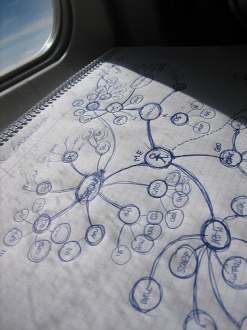
- cc luisvilla: http://is.gd/4xkiI
to use them can seem a thankless task. Its often pretty dry material and training sessions aren’t usually scheduled to link in with the point at which students immediately need to use the resources. Medical librarians at the Clinical Sciences Library are in the halfway through running some sessions this year which we hope begin to address this problem.
We have been experimenting with a new approach to our library training with our first year medics giving them a mindmap of information resources they need for their course. The School of Medicine invited us to get involved in their new ‘clinical problem solving’ module, which aims to get new students making connections between their modules and understanding deeper processes rather than trying to get by learning by rote. The students have to solve problems by making these connections and they are expected to be able to do their own research to before they can work out the answers. Google and Wikipedia alone won’t do this for them. This is where our information literacy training fit in.
Previously we have dived straight into Medline to get them conversant with the research literature and how to find it. This time we created a map of information resources. The map links directly out to the resources and is organised to help the students see which places to go for either an overview of a topic or for more detailed information. The resources range from dictionaries and clinical guidelines to statistics and bibliographic databases. It is hoped that the students can return to this map to help them clarify where to look for information at any time within their course.
In our training session the students are introduced to the resources on the map by integrating voting questions using Turning Point to ensure they understand them. Later in the session they are given the task to find the answer to a clinical question using two contrasting resources, explaining where they found the information to support their answer and also how they found it.
Its early days and when we have finished our sessions we will compile our feedback from the students and the course tutors. We are hopeful that the map has the potential to be developed into a more ambitious elearning tool useful for many different contexts.
Posted in Service Delivery, Subject Support, Training, Web 2.0 & Emerging Technologies | Tagged: information literacy, medicine, mindmap | 4 Comments »
Posted by gazjjohnson on 24 August, 2009
 Just come back from a session by Keith on using the voting handsets and software from TurningPoint in teaching sessions. I must confess to being quite impressed by the ease at which it was possible to set up slides and get responses from the audience, just using the PowerPoint plug in.
Just come back from a session by Keith on using the voting handsets and software from TurningPoint in teaching sessions. I must confess to being quite impressed by the ease at which it was possible to set up slides and get responses from the audience, just using the PowerPoint plug in.
One or two features like the onscreen timer do seem to be a little tempermental, but straight away I can think of some sessions that I’d like to seriously enliven using this coming year. While we’ve only 50 handsets for now, I can see that there will likely be a strong demand from my collegues for more of the handsets to cope with the larger numbers in some sessions.
So that was a promising session, and while I won’t be teaching as much with the new job, I can still see a use for them in my sessions on 3rd party copyright and etheses. Thanks to Keith for running the session!
Posted in Subject Support, Web 2.0 & Emerging Technologies | Tagged: classroom, handsets, interaction, powerpoint, turningpoint, voting | Leave a Comment »
Posted by gazjjohnson on 10 June, 2009
Following on from (and in no way inspired by I regret to report) my earlier posts about repository language, my colleague Andrew has put together a page on library language. He’s aimed it at our distance learning community, of which it is fair to say Lre have a lot. Andrew also has probably the lion’s share of them in his supported departments as well.
You can find the A-Z of Library Terms here.
I’ve chipped in on a few of these terms, and I’ve already had a few suggestions to add to the page. But I think anything we can do for the students (or indeed the staff) that helps demystify the terminology and processes that go up to make their library services are a good step in the right direction.
Posted in Subject Support, Training | Leave a Comment »
Posted by gazjjohnson on 22 May, 2009
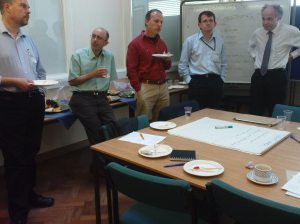 This morning I went off to the Learning and Teaching in The Sciences Unconference. What is an conference? It’s one where rather than a set agenda, the participants come together and draw one up. Ideally you run it over a day or two and aim to have real outputs at the end, but we had just a few hours. Normally the LTS Conference spans an afternoon or so with invited speakers. This year this wasn’t possible, but there was still a demand to meet and look at our teaching and a learning activities across the sciences.
This morning I went off to the Learning and Teaching in The Sciences Unconference. What is an conference? It’s one where rather than a set agenda, the participants come together and draw one up. Ideally you run it over a day or two and aim to have real outputs at the end, but we had just a few hours. Normally the LTS Conference spans an afternoon or so with invited speakers. This year this wasn’t possible, but there was still a demand to meet and look at our teaching and a learning activities across the sciences.
The focus was on assessment, and after voting on the aspects we wanted to look at fractioned off into smaller groups. I was in a group looking at the benefits to students and staff. After flying the flag for information literacy we came to a rough conclusion that whilst they may grumble about it, and focus on the final grade; assessment has real appreciable and demonstrable benefits to students, staff and the institution – with especial focus on the employ-ability and respect of our graduates.
We had a feedback session and then broke into new groups. This time I was looking at work placed assessment and placement. I spent a year in industry as part of my degree, and it was a wonderful terrifying, intensive and rich learning experience. We didn’t have as much time here, so we perhaps didn’t dig down as far as we might have hoped. We then lunched and discussed the session.
One of the best outputs was uncovering one of my Chemistry academics as a tweeter and I’ve been following up on some of the discussions with @wozzza already. More than that? Well I hope to see unconferences like this more often at UoL. They take less planning, and other than refreshments need little more than a room and a few hours of people’s times. But the reinforcement of old networks and the generation of new linkages can only be of considerable benefit to the university. Thanks to my novel networks we made the http://scienceleicester.wordpress.com/, what will come from today?!
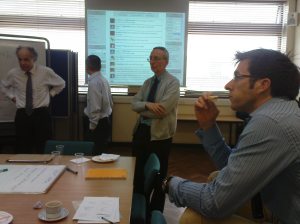 Well for one I introduced Alan Cann to Belbin analysis; which he’d never heard of; so felt justly smug for a few fleeting seconds.
Well for one I introduced Alan Cann to Belbin analysis; which he’d never heard of; so felt justly smug for a few fleeting seconds.
Hopefully there will also be other blogs and formal reports too, to try and share this expertise and experience further. A big thanks to Stu Johnson of Student Developmentfor organising and facilitating the day.
The session also used a twitter-back channel discussion which we projected to the screen. As we were all using phones and tiny portable devices there was none of that regular clattering you might have heard in a computer lab. Worked quite well, as a few of us were documenting the session, and we also got quite a few comments from external people interested. And we trended on Twitter too! You can follow the twitter feed of discussions here
Posted in Staff training, Subject Support, Wider profession | Tagged: learning, leicester, sciences, teaching, unconference, uollts | Leave a Comment »
Posted by knockels on 5 May, 2009
There is an increasing range of resources on this topic, from government, libraries, learned and professional societies, and the NHS, among other people. Librarians organise knowledge, so last week I put together a webpage, as part of our existing pages on avian and pandemic flu (an earlier version of which is archived by the UK Web Archiving Consortium).
Today I added some new links, and due to the increasing length of the page, reorganised the page so that it is categorised, rather than just being one straight list.
Where have the links come from – well, some I found, but many have been found through postings to Twitter or email discussion lists – JISCMAIL-hosted lis-medical and evidence-based-health being good sources, as is the US based MEDLIB-L. And since colleagues here and in other libraries know about the page (because I have advertised it to them), many people have forwarded me links individually.
Why a old fashioned webpage? Partly because the flu pages are already there, and partly because they are easily accessible with no need to sign up for an account with anything (although I have listed a Twitter source, which would need an account).
And why me? I am the information librarian that covers the University Department of Infection, Immunity and Inflammation, which includes microbiology (although not all of the University’s interests in this field) and infectious and respiratory diseases.
Posted in Research Support, Subject Support | Tagged: H1N1, infectious diseases, influenza, swine flu | Leave a Comment »
Posted by selinalock on 20 March, 2009
JISC have just released a new briefing paper: Modelling the Library Domain, which is part of the TILE Project (Towards Implementation of Library 2.0 & the E-framework).
Here’s some of the key points that I managed to pick out of the JISC Speak:
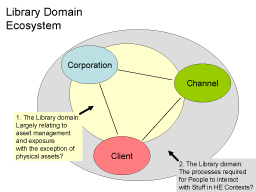
Library Domain Ecosystem Diagram from Briefing Paper
– Libraries need to look at providing widgets: integrate resources into web environments of the user’s choice.
– Supply value-added services.
– Tailor content to different types of users & encourage user generated content (reviews, ratings, comments).
– Regarding the diagram above: Corporation refers to content providers (Unis, Libraries, Publishers), Channel refers to the means of delivering the content & Clients are users involved in academic work.
– Libraries can either concentrate on managing and delivering their local assets/content, or look at widening their remit to include working with other channels in Higher Ed (e.g. reading lists, feedback, VLEs etc).
– “The wider role empowers libraries to provide a full set of services to meet a rich variety of locally identified user needs, potentially an institutional unique selling point.”
– More must be made of the user activity data available e.g. circulation data, number & types of downloads, which could possibly be linked through to student information (course, subject) without compromising data protection. This could provide the spark needed to engage user communities & encourage user generated content.
– “captured click streams rather than volunteered contributions (eg ratings, reviews, lists) are the surest source of intelligence about ‘users like me’.”
– If Libraries wish to provide more channel type services then the paper suggests encouraging concentration of services/content fro particular user groups & understand how they can become a trusted channel, the way services such as google are.
Posted in Digital Strategy & Website, Service Delivery, Subject Support, Web 2.0 & Emerging Technologies | Tagged: jisc, library 2.0, social networking, user generated content, Web 2.0 & Emerging Technologies, widgets | 1 Comment »
Posted by sarahw9 on 12 March, 2009
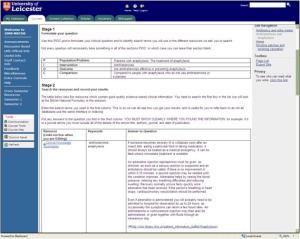 This is our second year of using a wiki in our session with 1st year medics ‘Finding the Evidence’. The purpose of this session is to make sure that students understand both where to find and how to use resources that support evidence based medicine. This exercise also aims to support the students as they embark on their 10,000 word dissertations where they follow a real patient for two years, looking at the the patients’ medical condition, treatment and their social context.
This is our second year of using a wiki in our session with 1st year medics ‘Finding the Evidence’. The purpose of this session is to make sure that students understand both where to find and how to use resources that support evidence based medicine. This exercise also aims to support the students as they embark on their 10,000 word dissertations where they follow a real patient for two years, looking at the the patients’ medical condition, treatment and their social context.
We set the students a clinical question, for example, they may be asked if a particular drug helps a medical condition or what evidence there is to support a particular type of treatment (I don’t want to give away of our real questions here!).
Before the training sessions the students are given an assignment which they complete in groups of 3. In the wiki there is list of resources they have to search. They have to record their search strategy (keywords and more detail if relevant), and what they find in answer to the clinical question. Then they have to write a conclusion based on all the evidence they have found, and make any observations about differences of opinion they find in the literature.
The resources they search are: Clinical Knowledge Summaries; Intute; Medline; The Cochrane Library; and the British National Formulary. This is to familiarise students with guidelines for physicians, prescribing doses, patient information, as well as the literature at the highest level of evidence and the more exploratory (but still peer reviewed) levels of research literature.
When they arrive at the session the students are given some further background to evidence based medicine and are shown some extra tips on searching these tools. We hope they actually take it in now they have used them the tools for themselves. We discuss the ‘answer’ to the clinical question they were asked and give feedback to the students on their assignments. Then the fun starts as they are asked to look at another wiki and enter comments on each others wikis, noting three things another group did differently to themselves. I think this is quite eye-opening for them – to see that another group answering the same question using the same resources finds different results and emphasises different aspects of the question. They should (and virtually all did in fact) find the same basic bottom line answer to the question, but there may be a few subtleties for example different situations where different treatments are applicable or where the evidence is unclear. We also ask the students to say what they would do differently if they were going to do this exercise again.
We are still compiling our feedback from the sessions, but so far it it mostly good, and amazingly the students say they can see the point of the exercise. I think in future we need to consider ways to focus the students’ comments more. Some have put in alot of detail and constructive comments, others are more along the lines of ‘ours was better than yours’.
Overall this is a good way to focus students on particular resources. It is also very specific to a particular question and plugs straight into resources they are going to be using for their dissertations (or they should be using).
Selina has also used a wiki with the computer scientists if you want to compare notes and outcomes. Interestingly different groups of students have different characteristics as a whole. This type of exercise may be working for medics and computer sciencists, but would it work for others? Perhaps its time we tried it.
Posted in Subject Support, Training, Web 2.0 & Emerging Technologies | Tagged: information literacy, teaching, Training, undergraduates, wiki | 6 Comments »
Posted by sarahw9 on 12 January, 2009
During 2008 Alan Cann and I ran a UoL TEF funded project Using Web 2.0 to Cultivate Information Literacy via Construction of Personal Learning Environments. On Wednesday 14th January 2009 between 12.30-2pm (GMT) we will be presenting a live TAN session in which we will outline the project and its main outcomes. Most of the session will be a discussion of how information literacy can be developed across the University.
If you would like to attend this seminar, please email the UoL Staff Development Centre on staffdev@le.ac.uk
Additionally, we will be conducting a live Twitter session at this event. If you would like join as a remote participant, the slides for the session are:
Posted in RSS, Service Delivery, Subject Support, Training, Web 2.0 & Emerging Technologies | Tagged: information literacy, seminar, twitter, Web 2.0 & Emerging Technologies | 5 Comments »
Posted by selinalock on 19 November, 2008
I taught a new session on RefWorks to 30 third year Computer Scientists yesterday, which didn’t quite go to plan, as there was no projector to be found in the lab. I quickly realised that trying to teach software without the ability to demo certain actions is quite hard!
I ended up getting small groups around my computer to demo certain bits and the students picked it up quite quickly. Though there were initial groans when I told them to login to Windows instead of linux.
I also realised a few minutes into the session that several of the students would be writing up their projects in LaTeX and so the whole Word plugin side to RefWorks was irrelevant to them.
If I do the session next year then I think I will:
- Make sure there’s a projector!
- Give an overview of how to reference to start the session.
- Ensure they login to Windows at the start of the session.
- Give them the option to learn about RefWorks.
Posted in Referencing, Subject Support, Training | Tagged: computer science, reflection, refworks, teaching | 2 Comments »
Posted by knockels on 18 November, 2008
For a while I have run a class on critical appraisal/critical reading (“how to read a scientific paper”), as part of the PhD training in Medicine and Biological Sciences, and as a drop in workshop for Student Learning Centre. It has taken a lot of tinkering to get it where it is, and last year I did feel that it was about right. This year it doesn’t feel quite so good, though.
Why is this? We have run two classes this year, for the first time, one for biomedical sciences, and one for non-biomedical. Is that it? I am not sure that we need two classes (except in the PhD programme for logistical reasons), but I am not sure that this is the reason. The SLC workshop is prone to being attended by people who are not having to read scientific journal papers. Is that it? Yesterday, I had one psychologist, one management PhD, one psychologist, and one political scientist. I deliberately looked for an idea of how useful it was to them, and it did seem to be very useful.
I have also become interested in the idea that “critical thinking” is the broad topic here, and that “critical reading” is applying “critical thinking” to reading papers. If that is the case, then the skills ought to apply across disciplines, and not be the exclusive preserve of the sciences. I have come at this topic from the point of view of the medical librarian working with health practitioners to critically appraise papers (as part of the process of evidence based medicine). The critical thinking approach might make the subject more relevant to wider groups of people. This has been one of the most interesting things about this class, applying things across such a wide range of people, and maybe this new approach will help.
Posted in Research Support, Subject Support, Training | Tagged: information literacy, teaching | 1 Comment »
Posted by knockels on 18 November, 2008
Operating Department Practitioners (ODPs) work with patients before, during and after surgery, and have to acquire a diploma qualification. The Medical School runs such a course, and the library has had an input since the course started.
I have an afternoon (in practice, 2 hours) to teach database searching skills. The session has become set like this: first, they search the internet for recipes to satisfy both of 2 friends (one cannot eat dairy, one cannot eat wheat). This is an exercise that Sarah W devised and which we used with medical students. Then we look on the internet for “nil by mouth”, and then we move into Medline and look for peer reviewed journal literature. The first exercise gets them thinking about choosing search keywords and combining them, and the second gets them thinking about alternative terms (try the “nil by mouth” search and see what you get, remembering who the students are).
I’ve been pleased with this session, and have run it like this for the past three or four times (it runs twice a year, as there are two cohorts a year). This time I threw in using the voting handsets, and for the past couple of times we have had a “step by step” handout to lead us through Medline. But this time I did feel that the session was too bitty. I like the recipe search (it assumes that they do already search the net), and I like the nil by mouth search, as it might show them how to use search engines efficiently. Medline is certainly a must – they are expected to use journal articles in their assignments and not rely on things found through Google. I do wonder (as I do for other groups) if PubMed would be better than Medline, but mostly I am thinking that this session is now comprised of too many, too different, parts. Something – perhaps the step by step handout (we used this with another group, successfully), and perhaps the handsets, might have to go.
Posted in Subject Support, Training | Tagged: information literacy, teaching | 1 Comment »
Posted by sarahw9 on 13 November, 2008
 The University of Cambridge library has given its web pages a distinctly web 2.0 look. Their science pages still include the familiar metasearching across library databases, the library catalogue and e resources. There are now alot of RSS feeds – from external resources and also news from their departments, science blogs, and new books at the library. There is a live chat box for users to contact the library, as well as the usual list of contact methods. Users can use a word cloud to navigate to the page for their department.
The University of Cambridge library has given its web pages a distinctly web 2.0 look. Their science pages still include the familiar metasearching across library databases, the library catalogue and e resources. There are now alot of RSS feeds – from external resources and also news from their departments, science blogs, and new books at the library. There is a live chat box for users to contact the library, as well as the usual list of contact methods. Users can use a word cloud to navigate to the page for their department.
It looks good, but visually there are almost too many feeds for my taste. Is this me, or do you just stop seeing what is there? It looks like a Pageflakes page, which I think if you haven’t designed it yourself is offputting.
I like the links to their own latest research and the focus on how to contact the library. Perhaps the way forward is to try to promote local blogs, local research, local projects, connecting people as well as the usual library resources. Not to mention information literacy related materials of course.
Posted in Subject Support, Web 2.0 & Emerging Technologies | Tagged: science, Subject Support, Web 2.0 & Emerging Technologies, webpages | 9 Comments »

 Just come back from a session by Keith on using the voting handsets and software from TurningPoint in teaching sessions. I must confess to being quite impressed by the ease at which it was possible to set up slides and get responses from the audience, just using the PowerPoint plug in.
Just come back from a session by Keith on using the voting handsets and software from TurningPoint in teaching sessions. I must confess to being quite impressed by the ease at which it was possible to set up slides and get responses from the audience, just using the PowerPoint plug in. 


 This is our second year of using a wiki in our session with 1st year medics ‘Finding the Evidence’. The purpose of this session is to make sure that students understand both where to find and how to use resources that support
This is our second year of using a wiki in our session with 1st year medics ‘Finding the Evidence’. The purpose of this session is to make sure that students understand both where to find and how to use resources that support 